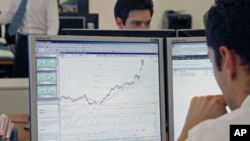European stock markets fell in early trading Thursday, largely on concerns about the fiscal health of the continent’s banks. But the markets bounced back in the afternoon, after French and German leaders scheduled an emergency summit to address the euro zone’s debt crisis.
It looked like another day of heavy losses on European markets, following drops in key Asian stock indexes.
But the trend was reversed in the early afternoon.
Analysts said investors took some comfort from news that French President Nicolas Sarkozy and German Chancellor Angela Merkel are to meet next Tuesday to discuss the continent’s debt situation.
Even with those late-day gains, during the last two weeks the London stock index is down more than 15 percent, and the German and French indexes are down more than 20 percent.
Many concerns
Investors have become increasingly concerned that troubled economies in the euro zone may face further problems meeting their debt payments, and that more countries and commercial banks may be affected by the crisis.
But the move by the two key European leaders to increase their personal involvement in trying to ease the situation provided enough confidence to turn stock prices around.
At the London School of Economics, Professor Iain Begg says decisive action by national leaders is exactly what is needed to address the debt crisis and the resulting impact on stock markets, bank confidence and economic growth.
“If we set too much store by one day’s movement, or even a few hours movement in the markets, we’d end up spending so much time gazing at our own navels that we wouldn’t be able to work out what’s really going on," said Begg. "And I think that what the politicians have been given is a warning sign. And now it’s up to the politicians to act much more decisively and cohesively. If they do that, then this froth in the market will probably go away.”
Lack of confidence
During a debate in the British Parliament Thursday, Finance Minister George Osborne blamed the stock market drops on what he called a lack of confidence in ability of governments to repay their debts. He called for international action to address the situation.
“This is a global as well as a European crisis, and at this autumn’s meeting of the IMF and the G-20 we need far greater progress on global imbalances," Osborne said. "We need an international framework that allows creditor countries like China to increase demand, and debtor countries to make the difficult adjustments necessary to repay them.”
Europe’s Central Bank has already issued guarantees designed to shore up confidence in troubled economies like Italy, Portugal and Greece. But some experts say the continent’s markets will not truly stabilize until there is agreement on issuing European bonds, through which individual countries would be able to borrow money with the full backing of all the euro zone countries
European Markets Bounce Back After Volatile Trading
